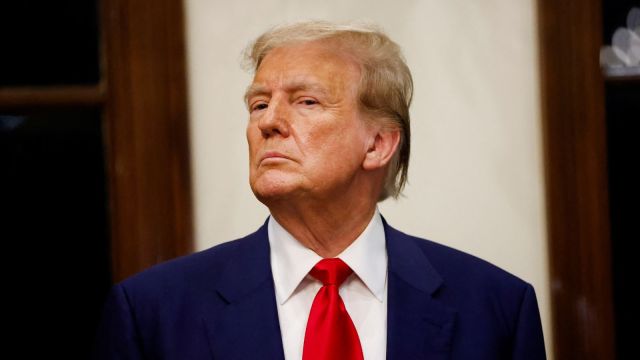
US President Donald Trump’s first 100 days in his second term have truly been momentous. No president in recent history can match the scale of disruption caused in just a few months of governance. In his attempts to restore America’s “greatness”, he arbitrarily changed US immigration policy, kicked out thousands of federal employees, hollowed out democratic institutions, imposed punishing tariffs on friends and foes alike, and presented himself as the greatest deal-maker for restoring peace in Ukraine and Gaza.
Having witnessed other methods failing to wrest the “decline” of America, people rallied around him with the hope that his disruptive policies would probably be needed to achieve a grand objective. Many subscribed to his view that some eggs need to be broken to make an omelette. However, there are early signs of his policies floundering on several fronts. People are losing faith in his capability to herald a new era — only 39 per cent of American citizens approve of his functioning so far, compared to 55 per cent who are sceptical and disapproving.
Let’s begin with his two most hyped policy measures: Cutting domestic spending through DOGE (Department of Government Efficiency) and enhancing state revenue through tariffs. DOGE was created to cut wasteful government expenditure under the leadership of his closest electoral ally and billionaire friend, Elon Musk. Musk set up a target of $1 trillion in annual spending cuts, but he himself recently admitted that DOGE’s efforts will not save more than $150 billion in the present financial year. DOGE terminated the contracts of thousands of federal employees, stopped emergency aid to Africa and the Middle East, and shut down one of the most important political instruments of American soft power — the US Agency for International Development (USAID).
Intoxicated by massive wealth and unhindered power, in less than 100 days, he became a political liability and is likely to depart soon to focus on his electric-car company, Tesla and SpaceX. Not unlike Trump, he employed the rules of corporate governance to government departments and, in the process, did irrevocable damage to both.
The next big thing for Trump was the reciprocal tariffs system put in place on April 2. On what he called “liberation day”, he announced a 10 per cent baseline tariff on goods from most trading partners of the US, about 25 per cent from some countries, and a monstrous 125 per cent on Chinese imports. For him, “tariff” became “the most beautiful word in the dictionary”, not realising that beauty lies only in the eyes of the beholder. How far his tariff regime will revive America’s manufacturing industry and create employment is yet to be seen, but it has created quite an inflationary pressure on the domestic economy and wreaked havoc on global trade.
The world is witnessing a trade-war between Washington and Beijing, and some economists believe that America is close to an economic recession. His measures have depleted the international community’s faith in the stability of the dollar and the global leadership of the US. If Trump remains adamant, then China, the European Union and other big economies will likely create alternative trading mechanisms independent of US influence. Washington would get entangled in bilateral negotiations, akin to London’s situation after BREXIT, while other economies will trade within alternative multilateral frameworks.
Finally, his claims of being a master deal-maker have also fallen flat. He has succeeded neither in ensuring a continued ceasefire in the Israel-Hamas war nor for the Russia-Ukraine war. He even offered a free hand to Benjamin Netanyahu and Vladimir Putin to demonstrate his ability to get things done quickly. But despite all the concessions, the wars continue unabated, as Trump’s warnings are wilfully ignored.
In the process, however, the US president has alienated NATO (North Atlantic Treaty Organisation) allies in Europe and sparked concerns among other friendly nations in Asia-Pacific. Ukraine’s leader Volodymyr Zelenskyy was humiliated during the infamous White House exchange with Trump, and he received no security guarantee and is under immense pressure to agree to terms of a ceasefire favourable to Russia. Nonetheless, Trump’s confidence in his own negotiating skills remains unshaken. Fortunately, New Delhi, given the flaring India-Pakistan tensions, does not support the idea of a third-party intervention in its negotiations of bilateral disputes. Trump must establish his credibility as a negotiator before offering his good office to others in the future.
It might still be too early to evaluate the holistic impact of his policies on domestic and international affairs. His immigration policy seems to still have quite some domestic approval. But with a faltering economy, widespread protests, legal hassles, and a dwindling support base, Trump will encounter several challenges in the coming days. On the global front, he has done irreversible damage to the US-led liberal international order without creating an alternative mechanism for global governance. Therefore, the world will likely witness more chaos and conflict, with US influence under Trump declining in the remaining three years of his term, and maybe even beyond.
The writer teaches at the School of International Studies, Jawaharlal Nehru University, Delhi. Views are personal